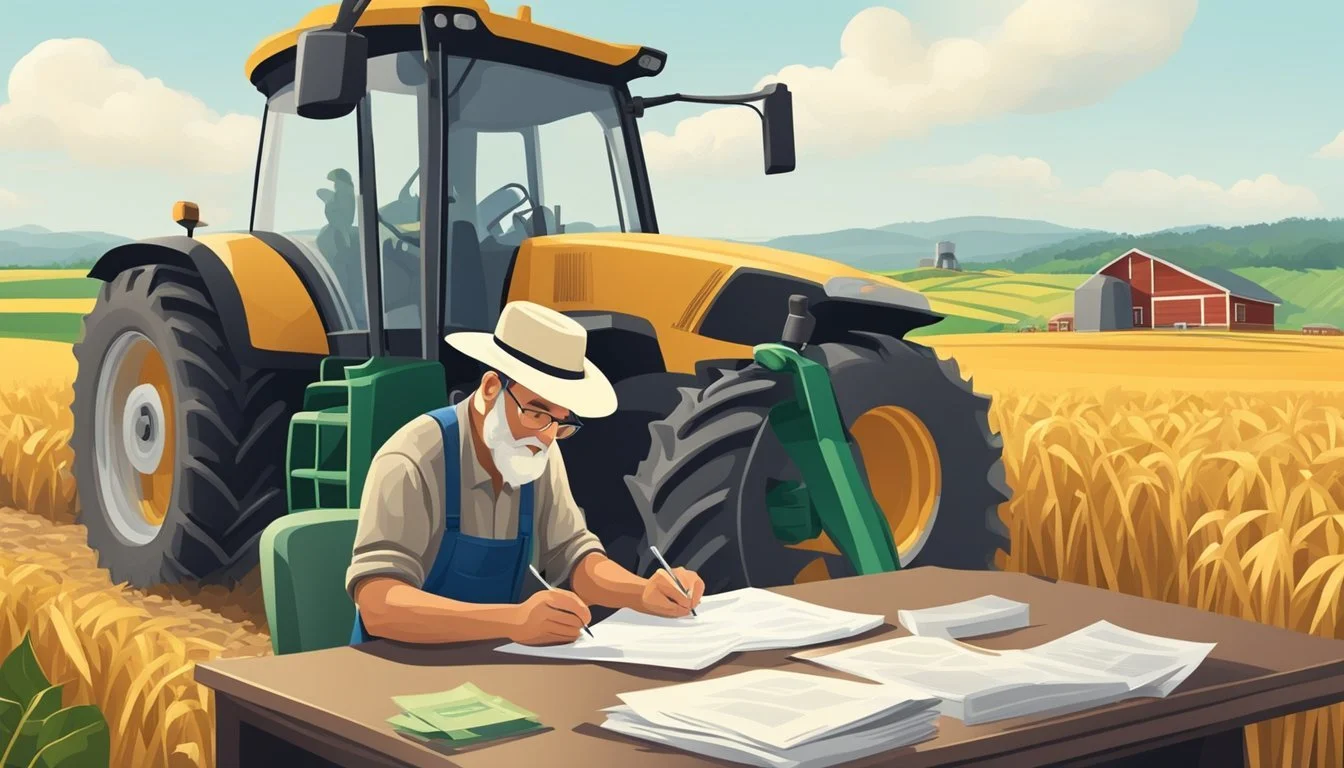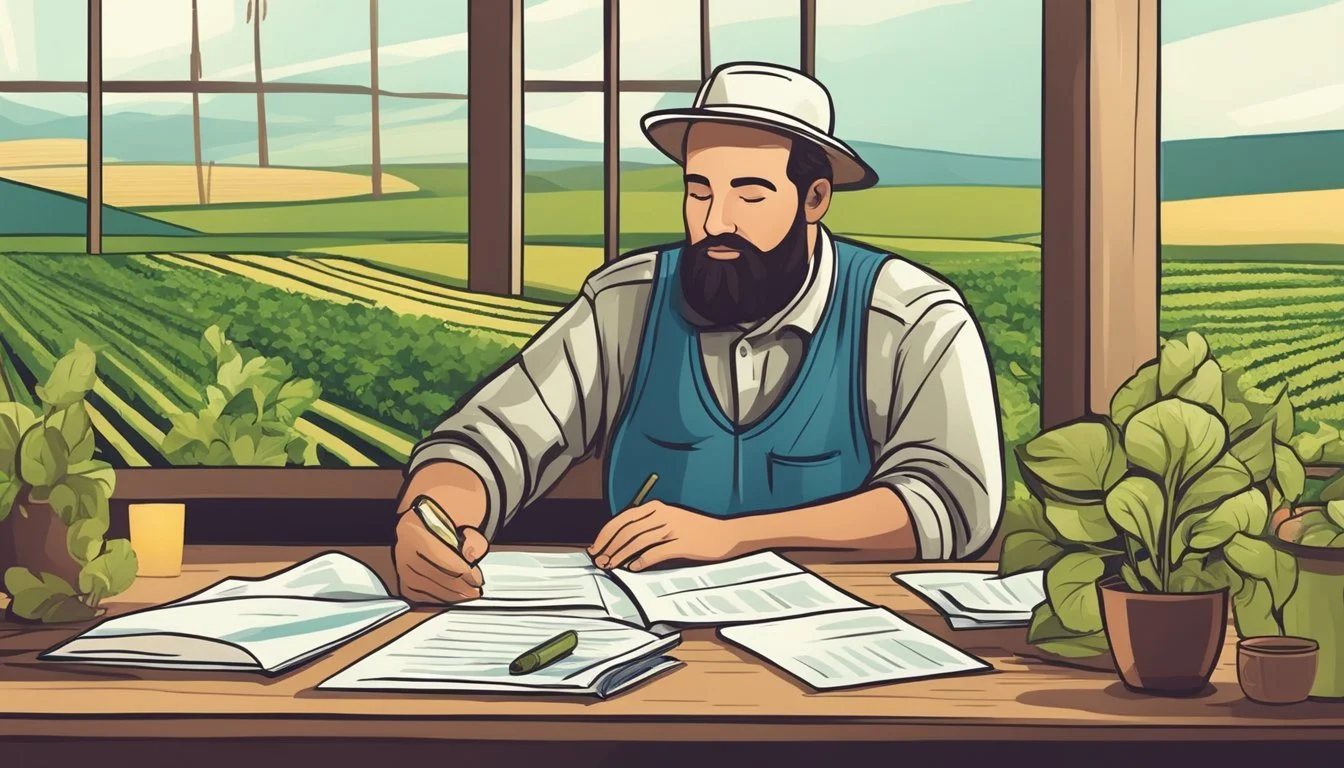Farm Loans in Georgia
Navigating Financing for Agriculture
This Article is Part of Our Guide on Farm Loans for All 50 U.S. States
In Georgia, agricultural financing is a critical component for farmers seeking to purchase land, invest in improvements, or manage day-to-day operations. Farm loans are tailored financial tools designed to meet the unique demands of the agricultural sector. With a deep understanding of the agricultural landscape, lenders in Georgia offer various loan products to support the state's farmers. These loans are essential for both small-scale and commercial agricultural producers, enabling them to compete effectively and sustain their operations year-round.
Various financial institutions across Georgia specialize in farm lending, providing a range of financial solutions. Long-term fixed rates for real estate and farm improvement loans are common offerings that cater to the diverse needs of farmers, from acquiring undeveloped tracts of land to settling in rural homes. Operating loans are also available to cover the costs associated with the cyclical nature of farming, such as planting, harvesting, and livestock management.
As agriculture continues to be a foundational element of Georgia's economy, farm loans have evolved to address the financial nuances of this sector. Providing much-needed capital, these loans facilitate the growth and expansion of farms, strengthening Georgia's rural communities and contributing to the state's overall economic stability. With various loan options and dedicated agricultural credit associations, Georgia's farmers have access to the resources needed to thrive in an ever-changing market.
Overview of Farm Loans in Georgia
Farm loans in Georgia are pivotal for sustaining and advancing the state's robust agricultural sector. They enable farmers to secure the necessary resources for their farm operations, allowing Georgia to continue its tradition of agricultural productivity and innovation.
Importance of Agriculture in Georgia
Georgia's economy is significantly bolstered by its agriculture, with the sector being a cornerstone of the state’s financial well-being. Agriculture contributes billions of dollars annually and is essential for the employment of many Georgians. The availability of farm loans ensures the continuous development and efficiency of agricultural practices across the state.
Types of Farm Loans Available
Farmers in Georgia have access to various loan types aimed at enhancing their farming operations. Farm Ownership Loans allow for the purchase or expansion of property, improvement of farm infrastructure, and implementation of conservation efforts. Additionally, farmers who faced discrimination in USDA farm lending programs prior to 2021 can seek assistance through the Discrimination Financial Assistance Program supported by the Inflation Reduction Act.
Private institutions like AgGeorgia Farm Credit offer real estate and farm improvement loans, as well as resources to secure land or expand existing farms. Moreover, the Georgia Development Authority (GDA) extends support to farmers via an insured farm loan program, actively engaging with banks and associations to benefit agricultural endeavors across every county in Georgia. The USDA’s Farm Service Agency also plays a vital role in financing, with loans tailored to help start, expand, or maintain family farms.
Eligibility and Requirements
To secure a farm loan in Georgia, applicants must meet specific qualification criteria and provide the necessary documentation. Thorough preparation and understanding of these requirements will streamline the application process with the USDA Farm Service Agency (FSA) or other lenders.
Qualification Criteria
Farmers seeking loan assistance for their operation or to purchase land must fulfill the following criteria:
Status: Must be classified as a beginning farmer, which typically means having been in operation for less than 10 years.
Ownership: Direct Farm Ownership Loans require partial financing for purchasing a family farm.
Non-Discrimination: Applicants who experienced discrimination in previous USDA farm lending programs before 2021 may be eligible for support through the Discrimination Financial Assistance Program.
To confirm eligibility, potential borrowers can utilize tools provided by the USDA, such as the Loan Assistance Tool, which guides through the qualification process.
Necessary Documentation
When applying for farm loans, applicants must be prepared to work closely with a loan officer and present a set of comprehensive documents, including:
Farm Business Plan: Showcasing the viability of the operation.
Farming Goals: Clear objectives for the farm's future.
Financial Records: Proof of capability to repay the loan.
Borrowers are encouraged to visit their local USDA Service Center with their complete documentation to begin the application process. Each document plays a crucial role in determining eligibility and the potential for loan approval.
Financial Institutions Offering Farm Loans
In Georgia, farmers have access to a variety of lending options when considering farm loans. From specialized agricultural lenders like AgGeorgia Farm Credit to commercial banks and government-supported programs, each offers unique support and financing solutions tailored to the agricultural sector.
AgGeorgia Farm Credit
AgGeorgia Farm Credit is a notable agricultural lending cooperative that provides a breadth of loan and lease products for farmers and agribusinesses. Owned by its member-borrowers, their approach to lending is rooted in developing a supportive relationship with Georgia's agricultural community.
Commercial Banks
Typically offering a wide array of financial services, commercial banks in Georgia may also provide farm loans with competitive terms. Farmers can benefit from working with local banks that understand their specific needs and can offer personalized financial support and advice.
Government Programs
The USDA Farm Service Agency (FSA) administers government programs that offer financial assistance to farmers. These include loans designed to support farmers who have faced discrimination in previous USDA lending programs as well as other targeted financial solutions aimed at bolstering the agrarian economy in Georgia.
Understanding Loan Terms and Rates
When exploring farm loans in Georgia, farmers must assess the difference between fixed and variable interest rates and the implications of choosing long-term financing. These decisions have a significant impact on the overall interest cost and the viability of their agricultural business.
Fixed Rates Versus Variable Rates
Fixed rates offer the certainty of consistent interest costs over the duration of the loan. Farmers with a preference for stable payments may opt for fixed rates to hedge against future interest rate fluctuations. For example, the USDA Farm Service Agency provides options that might include long-term fixed rates, which are especially relevant for investments in assets like timberland where the economic return period is extended. In January 2024, the interest rate for Farm Ownership - Direct loans was at 5.875 percent.
Contrarily, variable rates change with market conditions. They may start lower than fixed rates, but the unpredictability can lead to higher interest costs over time if the rates increase. This option can be favorable for those willing to take risks for potential interest savings.
Long-term Financing Options
Farmers in Georgia looking at long-term financing have access to programs like the USDA loans which might offer 80% financing or more, with terms that can extend up to 30 years. These 30 year fixed rates options allow for better long-term planning and stability in the farming business. Such terms are particularly advantageous when securing loans for capital-intensive purchases like timberland, which require a longer period to start generating returns. The exact terms, such as interest rates and the percentage of financing, are contingent on the lending program and the qualifications of the borrower.
Land and Real Estate Financing
In Georgia, entities such as AgGeorgia Farm Credit, Southwest Georgia Farm Credit, and USDA Farm Service Agency facilitate the procurement of farmland and financing for land improvements. These loans cater to a range of agricultural purposes, including but not limited to timber, poultry, dairy, and recreational uses of land.
Purchasing Farmland
When individuals or entities are looking to purchase farmland, a variety of loan options are available that meet specific agricultural needs. Long-term fixed-rate loans provide stability and predictability for borrowers, allowing for thoughtful planning for the farm's future. For example, AgGeorgia offers financing solutions for those acquiring large tracts or investing in land for future use. Loans may cover purchases of land for diverse types of farming such as timber and dairy production. Recreational land used for hunting or other non-farming activities can also be financed through these tailored programs.
Financing Land Improvements
Farmers and ranchers may seek special loans designed for land improvements which elevate the value and productivity of the property. This includes enhancements like irrigation systems, buildings, and other infrastructural upgrades necessary for efficient agricultural operations. Loans from the USDA Farm Service Agency can offer up to 100 percent financing, highlighting their aim to increase agricultural productivity and to secure farmland for subsequent generations. Additionally, operations like poultry farms often require specialized facilities, and financing options are available to support the development of such structures.
Operating Loans for Daily Farm Needs
Operating loans are essential financial tools that allow Georgia farmers to manage daily expenses efficiently. These loans offer the necessary capital to cover the immediate operational costs that are critical for farm sustainability and growth.
Lines of Credit
Lines of credit provide farmers with flexible financing solutions tailored to their cyclical cash flow needs. Georgia farmers often utilize lines of credit to;
Purchase seeds and fertilizers
Finance labor costs
Cover unexpected expenses
Lenders understand that these needs can vary significantly throughout the year, which is why lines of credit are designed with repayment terms that align with farming income patterns.
Farm Improvement Loans
Farm improvement loans are specialized finances dedicated to enhancing a farm's infrastructure and operational efficiency. Key investments under these loans include:
Building or improving farm structures like barns or dwellings
Promoting soil and water conservation efforts
Upgrading farm equipment and technology
Such loans ensure that farm owners can undertake necessary improvements without impairing their ability to meet other financial obligations.
Additional Financial Support Options
In Georgia, farmers have access to a variety of programs that aim to provide financial support beyond conventional loans. These initiatives are designed not only to offer immediate financial relief but also to invest in the long-term sustainability and growth of the agricultural sector.
Patronage Refund Program
The Patronage Refund Program represents a key financial mechanism for farmers who are part of cooperative lending institutions. Patronage distributions are essentially a way of returning a portion of the cooperative’s profits to its member-borrowers. These distributions are often calculated based on the proportion of business each member conducted with the co-op, and they can provide significant financial support. Farmers can estimate their potential patronage refund using a patronage calculator provided by their cooperative, which reflects an estimated patronage based on previous years' profits and the individual's loan activity.
Educational Resources and Community Support
Georgia places strong emphasis on bolstering the future of agriculture through education and community engagement. Various programs are available to help members of the agricultural community stay informed about best practices and innovative farming techniques. These programs not only provide educational resources but foster a support network for farmers navigating financial challenges. By empowering farmers with knowledge and uniting them through community support, Georgia aims to secure a resilient and prosperous agricultural industry.
Building and Sustaining Farmer Relationships
Strong farmer relationships are rooted in trust and continual engagement. These ties offer peace of mind, potentially improving profits and securing the livelihood of family operations.
Working with a Relationship Manager
Farmers often work closely with a relationship manager who serves as their primary contact within financial institutions. This manager plays a critical role in understanding the farmer's unique needs and tailoring services accordingly. They facilitate the loan process, ensuring that members are informed and comfortable with the financial decisions impacting their farm's future.
Responsibilities of a Relationship Manager:
Assess and respond to individual farm needs
Provide ongoing support and practical advice
Maintain clear and open communication
Build long-term trust with each member
Role of the Board of Directors
The Board of Directors is integral in shaping the policies and offerings that affect member relationships. They must comprehend the diverse challenges that their members face, especially in various agricultural sectors.
Duties of the Board of Directors:
Guide the overall philosophy and direction of financial offerings
Ensure that the institution's actions align with members' wellbeing
Foster transparency and accountability within the organization
Oversee the appointment of capable relationship managers
By prioritizing robust support systems and the selection of dedicated relationship managers, financial institutions assist farmers in navigating the complexities of agricultural finance, laying the groundwork for a successful and resilient agricultural community.
Construction and Development
In Georgia, agricultural loans cater to various needs, including construction and development projects on farms. They facilitate the construction of agricultural buildings and the development of residential structures within farm properties.
Home Construction and Mortgages
When it comes to home construction on farmland, agricultural lenders offer tailored loans for both the construction phase and the subsequent mortgage. Loans for home construction typically cover costs such as materials and labor, and may allow interest-only payments during construction. Once the home is complete, the loan often converts to a traditional mortgage. Intangible taxes, a one-time tax based on the loan amount, are applicable to mortgages in Georgia and must be considered in the financing plan.
Intangible Tax Rate: typically, $1.50 per $500 of the loan amount.
Lease-to-own: An option for individuals planning to initially lease the property before purchasing.
Constructing Farm Buildings and Facilities
Loans tailored specifically for constructing farm buildings and facilities are crucial for farm expansion and efficiency. These loans cover the development of structures such as barns, storage sheds, and processing facilities. Financing for such constructions usually considers the long-term value addition to the farm and may involve certified appraisers to assess the costs accurately.
Certified Appraisers: They determine the present-day value of planned constructions.
Loan Structure: Typically includes a repayment plan aligned with farm revenue cycles.
Strategic Planning for Long-Term Success
Strategic planning is critical for the long-term success of any farming operation. It not only encompasses the financial aspects, such as securing favorable terms on farm loans and managing effective interest expense, but also involves investing in farm technology and preparing for future challenges.
Investment in Farm Technology and Equipment
In Southwest Georgia, farmers are increasingly recognizing the benefits of integrating advanced technology and equipment into their operations. Investing in new technology can optimize resource use and improve crop yields. Precision agriculture tools, for instance, enable farmers to strategically allocate resources like water, fertilizer, and pesticides, thereby reducing waste and enhancing productivity.
Notable investments include:
GPS-guided tractors
Automated irrigation systems
Drones for crop surveillance
These technologies contribute to a lower effective interest rate on loans by improving the farming operation's profitability and collateral value.
Preparing for Future Challenges in Farming
Farmers must look ahead and prepare for potential obstacles, from climate change impacts to market fluctuations. A robust strategic plan will factor in measures to handle these challenges:
Risk Management: They should consider insurance products and financial instruments that can mitigate the risks of natural disasters or price drops.
Infrastructure Improvements: Investing in infrastructure such as fencing and ponds can enhance the farm's resilience to environmental changes. For instance, good fencing can protect crops from wildlife, while ponds can serve as a water source during droughts.
Through deliberate strategic planning geared towards embracing technology and anticipating future hurdles, farming operations in Georgia can establish a framework for sustainability and growth.








